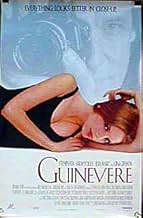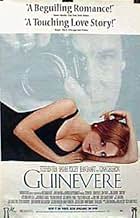PUNTUACIÓN EN IMDb
5,9/10
2,8 mil
TU PUNTUACIÓN
Una joven se rebela y se involucra con un fotógrafo mucho mayor.Una joven se rebela y se involucra con un fotógrafo mucho mayor.Una joven se rebela y se involucra con un fotógrafo mucho mayor.
- Premios
- 2 premios y 7 nominaciones en total
Sharon McNight
- Leslie
- (as Sharon Mcnight)
Reseñas destacadas
Thoughtfully written, well acted, provocatively true to life... this is a movie for the intelligent, mature audience, not a movie to appeal to the lowest common denominator. Those who are too lazy to think (or just unable to!) won't "get it" and will condemn it because it did not hand them an answer on a platter. Those who thought about the story rather than merely reacting and who dug into the emotions found level after level of story and enjoyed the irony of the fact that even the most intelligent among us frequently do something we may later view as stupid. Even so, those "stupid" things help shape who we are, and may be as important to the formation of who we are as the "correct" choices we also make.
Worth the ticket and worth buying it on DVD when available.
Worth the ticket and worth buying it on DVD when available.
Writer/director Audrey Wells, who would go on to make 2003's "Under the Tuscan Sun" as well as the recent "Shall We Dance", directed Sarah Polley in 1999's "Guinevere". Wells' forte seems to be characters in search of romance who find it in unexpected places. It was the 'ugly' girl in "Truth About Cats & Dogs", Italy in "Tuscan Sun", and the older man in this film. That older man is played with wild abandon by Stephen Rea, often inappropriately stealing the show. Ignoring Jean Smart's histrionic heavy scene later in the film, and the control Rea's Connie has over Polley's Harper, this is Sarah Polley's film. What make this film work is its sensitivity and subtly, especially toward Harper's youth, naivete, and uncertainty in love and life. It's a sweet film about self-discovery at any age, and although it gets a bit moody toward the end, it works well as a date movie.
The young Canadian actress Sarah Polley can sizzle in character parts--she burns a hole in the screen in her tiny bit in Cronenberg's EXISTENZ, and she was luminous as the princess in the wheelchair in THE SWEET HEREAFTER. But in leading roles, she seems both brittle and amoeboid. As Harper, the insecure and overlooked daughter of a family of cutthroat lawyers, she has one amazing scene--being seduced, her reactions fry out her speakers, sending from giggly hysteria to overdrive lust. Harper is seduced by an aging bohemian wedding photographer (Stephen Rea)--a lush who talks a big game, pontificates in bars with his low-rent cronies, and makes a sport and a pastime of mentoring (and groping) avid young women. But we don't see any hunger, any passion or obsession in Harper. When the photographer, Connie, tells her she has talent it's an obvious pick-up line--not because she hasn't done any work, but because she shows no interest in anything but being noticed.
The writer-director, Audrey Wells, doesn't show much interest in anything else, either. The author of the scripts for GEORGE OF THE JUNGLE and INSPECTOR GADGET, her first indie feature has more than a whiff of the dilettante. Like AMERICAN BEAUTY, GUINEVERE likes to flirt with the idea of having an "edge," then shies away from it. Both of these movies are just too damned clear. The pleasure of that seduction scene is that Harper responds in ways that are messy, funny, unprogrammed; every other scene in the picture makes its point in letters so bold the thickest member of the audience couldn't miss it.
You can take the girl out of the studio, but ain't no way you're taking the studio out of the girl. The lechy photographer's big sin--the thing that makes him evanesce in Harper's eyes--is that, at fifty, he's still stumping and hustling for cash. Can Audrey Wells really intend that it's okay for Connie to be a serial phony, an ego-inflating come-on artist, but his real Achilles' heel is that he never made real money? (Wells' point seems to be: Connie gets Harper's tender young flesh--he could at least pay the bills.) Every scene is so blandly overdetermined it reeks of falsity--especially the much-applauded one where Harper's bitchy mom (Jean Smart) comes into Connie's loft and undoes their relationship with a single cutting observation. (Would these lovers react with such shock to such an obvious accusation?)
For someone making a movie about the romance of the artist's life, Wells seems to have no clue how artists talk to each other, or even behave--she seems to think that's egghead stuff the audience won't care about. But it's that, not sex, that's supposed to be the fundament of Connie and Harper's relationship. Despite Rea's and Polley's efforts, the movie drowns in big-movie timidity. And the ending--a Felliniesque princess fantasy where all of Connie's sweet young things gather for an All That Jazz adieu--maybe intended to be tender. It comes across as a final, passive-aggressive flipping of the bird to a half-forgotten, dirty-minded teacher.
The writer-director, Audrey Wells, doesn't show much interest in anything else, either. The author of the scripts for GEORGE OF THE JUNGLE and INSPECTOR GADGET, her first indie feature has more than a whiff of the dilettante. Like AMERICAN BEAUTY, GUINEVERE likes to flirt with the idea of having an "edge," then shies away from it. Both of these movies are just too damned clear. The pleasure of that seduction scene is that Harper responds in ways that are messy, funny, unprogrammed; every other scene in the picture makes its point in letters so bold the thickest member of the audience couldn't miss it.
You can take the girl out of the studio, but ain't no way you're taking the studio out of the girl. The lechy photographer's big sin--the thing that makes him evanesce in Harper's eyes--is that, at fifty, he's still stumping and hustling for cash. Can Audrey Wells really intend that it's okay for Connie to be a serial phony, an ego-inflating come-on artist, but his real Achilles' heel is that he never made real money? (Wells' point seems to be: Connie gets Harper's tender young flesh--he could at least pay the bills.) Every scene is so blandly overdetermined it reeks of falsity--especially the much-applauded one where Harper's bitchy mom (Jean Smart) comes into Connie's loft and undoes their relationship with a single cutting observation. (Would these lovers react with such shock to such an obvious accusation?)
For someone making a movie about the romance of the artist's life, Wells seems to have no clue how artists talk to each other, or even behave--she seems to think that's egghead stuff the audience won't care about. But it's that, not sex, that's supposed to be the fundament of Connie and Harper's relationship. Despite Rea's and Polley's efforts, the movie drowns in big-movie timidity. And the ending--a Felliniesque princess fantasy where all of Connie's sweet young things gather for an All That Jazz adieu--maybe intended to be tender. It comes across as a final, passive-aggressive flipping of the bird to a half-forgotten, dirty-minded teacher.
Guinevere: Harper Sloane (Sarah Pollack) is a painfully shy young woman trapped in a household of lawyers lorded over by an alpha-mother (Jean Smart) who treats her like a servant. Destined to attend Harvard law school and join the pack, Harper finds her salvation in Connor Fitzgerald (Steven Rea), part-time photographer/philosopher, full-time con-man Svengali. Connor actually listens to what she says and offers her escape into an exciting bohemian lifestyle. Will he be her salvation or downfall? There are shades of Leaving Las Vegas in this film - it is dark and at times unpleasant - one scene in particular made me so uncomfortable I turned away from the screen. To its credit, Guinevere, like Leaving Las Vegas, is also a very good film. Sarah Pollack is outstanding as the withdrawn Harper (in stark contrast to her brazen, street-wise savvy Ronna in Go!). Although she's actually twenty, she looks fifteen, which helps to convey a believable vulnerability and transformation.
Rea is truly manipulative as Connor, more pathetic than sinister, who preys on young women - you're never quite sure if you should loathe or pity him. Finally, Jean Smart does an excellent job as the hard-as-nails matriarch, miles away from her smarmy character on Designing Women.
Well worth the price of admission.
Rea is truly manipulative as Connor, more pathetic than sinister, who preys on young women - you're never quite sure if you should loathe or pity him. Finally, Jean Smart does an excellent job as the hard-as-nails matriarch, miles away from her smarmy character on Designing Women.
Well worth the price of admission.
I can't say exactly what, but something is missing in this movie. Poor Connie. I think he gets less out of the relationships than the Guineveres. Maybe I like things "tied up" too much, but I wish we'd seen a little of Harper's work so we could judge just how well Connie taught her. A scene of her in a gallery or studio somewhere surrounded by her work as she answers a ringing telephone (presumably with Billie on the other end) would have been satisfying--no dialog necessary, just a look of sadness on her face. Whatever else, this movie sure spurred some dialog between my 25-year-old daughter and me.
Interesting that (along with another reviewer) I saw the connection between the Stephen Rea character, Connie, in this movie and Herman Wouk's Noel Airman in the 50's novel "Marjorie Morningstar" and talked about that as we walked home. And as big a bitch as Harper's mother was, she had it right as she saw through Connie. Beautifully acted by all principals!
Interesting that (along with another reviewer) I saw the connection between the Stephen Rea character, Connie, in this movie and Herman Wouk's Noel Airman in the 50's novel "Marjorie Morningstar" and talked about that as we walked home. And as big a bitch as Harper's mother was, she had it right as she saw through Connie. Beautifully acted by all principals!
¿Sabías que...?
- CuriosidadesDuring the non-union shoot in San Francisco, crew members struck and were joined by star Sarah Polley, who walked the picket line. Striking crew members report that they were quite touched by her action, which was more than a gesture, but rather a sincere belief in workers' rights. On her part, Polley called her union, the Screen Actors Guild, to tell them of her action, and the union representative told her they'd back her if she crossed the picket line. SAG assumed that she was calling to ask whether she could defy the strike and cross the picket line! A shocked and dismayed Polley stayed out with the strikers, and the strike ended after three days when their grievances were met. Subsequently, Polley has stated that she has been told that she lost several job offers due to this incident as producers don't want a union 'militant' despite the film industry being a craft industry dominated by the guild (union) system and she did what she felt was right.
- PifiasThe wet spots on Harper's shirt after taking a shower. They're inconsistent.
- Citas
Harper Sloane: You're obviously mistaking me for someone with potential.
- Banda sonoraCoquette
Music by Carmen Lombardo & Johnny Green
Lyrics by Gus Kahn
Performed by John Pizzarelli
Courtesy of The RCA Records Label of BMG Entertainment
Selecciones populares
Inicia sesión para calificar y añadir a tu lista para recibir recomendaciones personalizadas
- How long is Guinevere?Con tecnología de Alexa
Detalles
- Fecha de lanzamiento
- País de origen
- Idioma
- Títulos en diferentes países
- Das Mädchen und der Fotograf
- Localizaciones del rodaje
- Empresas productoras
- Ver más compañías en los créditos en IMDbPro
Taquilla
- Presupuesto
- 2.600.000 US$ (estimación)
- Recaudación en Estados Unidos y Canadá
- 632.283 US$
- Fin de semana de estreno en EE. UU. y Canadá
- 54.145 US$
- 26 sept 1999
- Recaudación en todo el mundo
- 635.680 US$
- Duración1 hora 44 minutos
- Color
- Mezcla de sonido
- Relación de aspecto
- 1.85 : 1
Contribuir a esta página
Sugerir un cambio o añadir el contenido que falta

Principal laguna de datos
By what name was Guinevere (1999) officially released in India in English?
Responde































